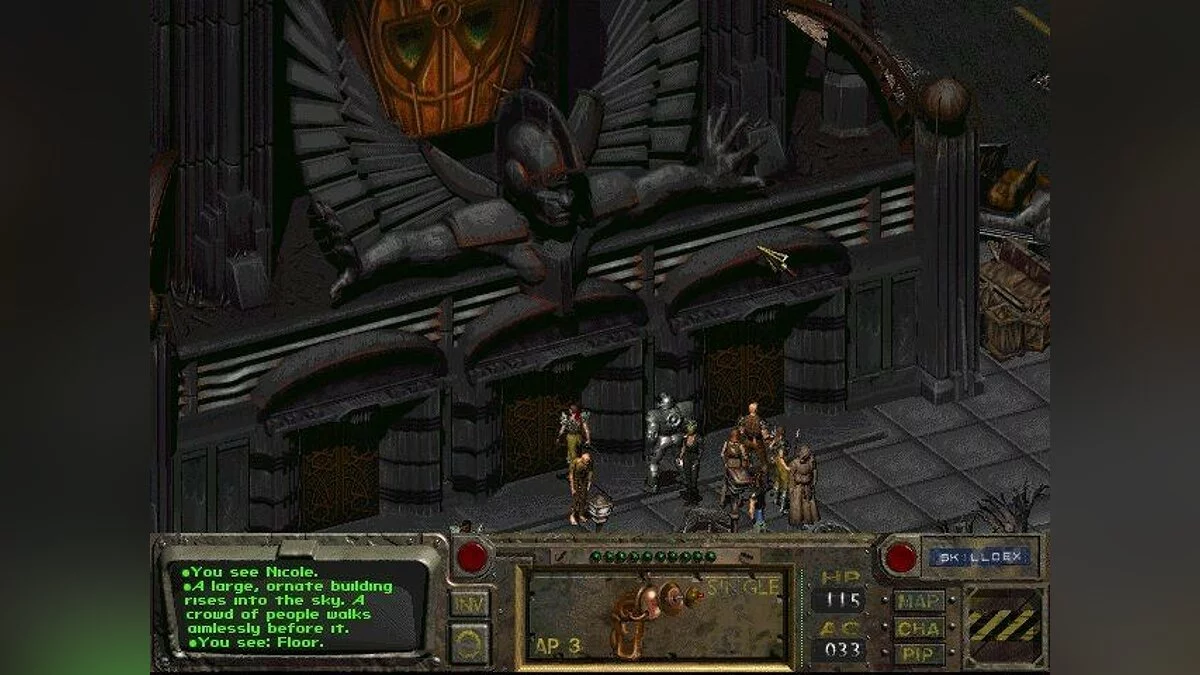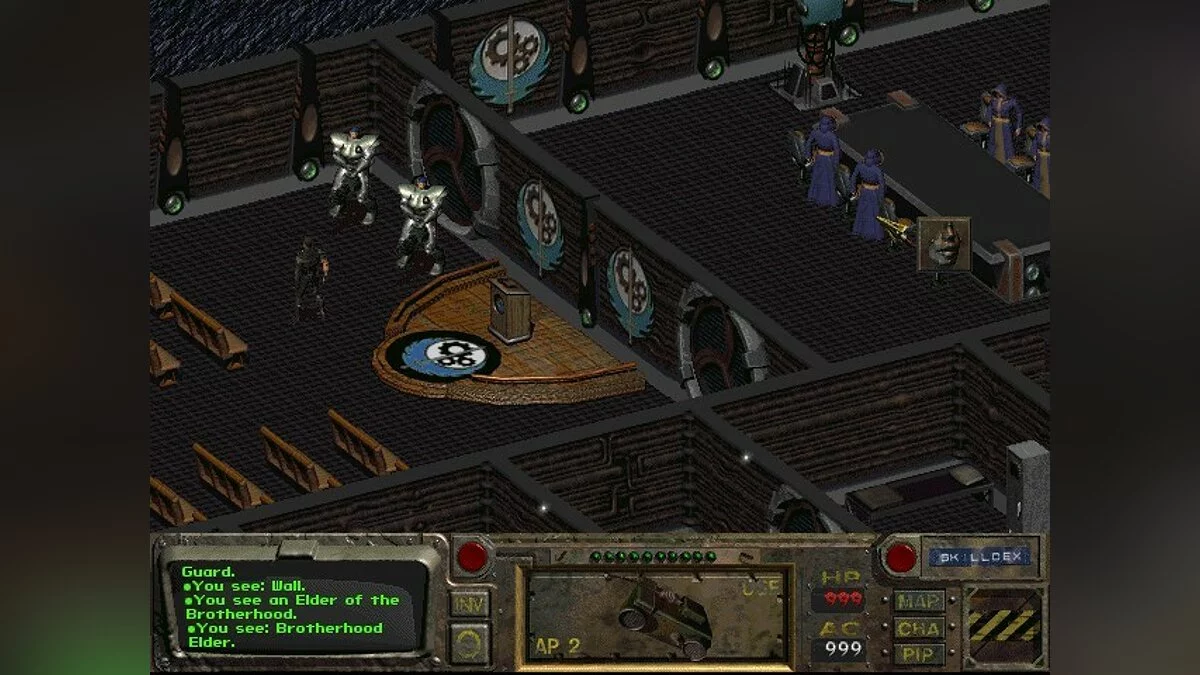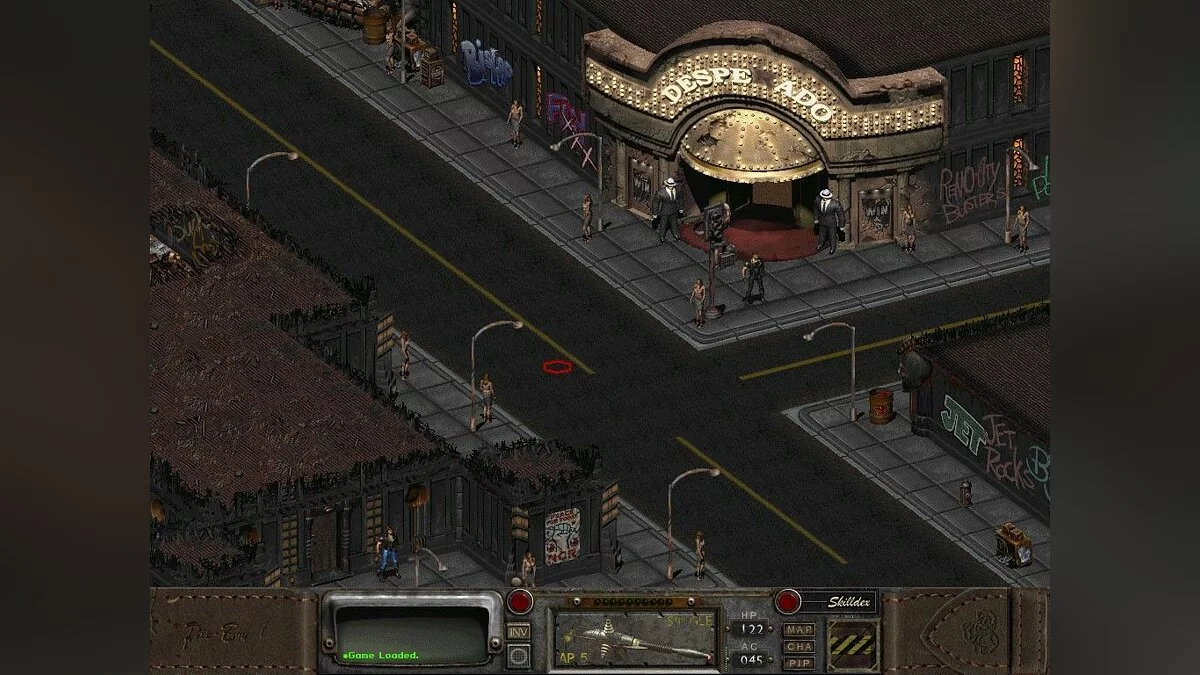Best RPGs
RPGs are one of the most powerful tools of escapism. Role-playing games don’t just transport players into fascinating virtual worlds — they essentially let you live a second life there. In today’s selection, we’ve gathered some of the genre’s most outstanding representatives — from the timeless classics of the '90s to modern releases.
Fallout
- Year: 1997;
- Platforms: DOS, Mac, PC;
- Co-op: no.
Outdated graphics — already outdated even at the time of its 1997 release — didn't stop Fallout from achieving cult status. That's because the game nails all the key elements of a great RPG: it has an intriguing setting, well-written dialogues, memorable characters, and impressive freedom of choice. On top of that, Fallout makes excellent use of dark humor and references to popular culture.
Fallout 2
- Year: 1998;
- Platforms: Mac, PC;
- Co-op: no.
The sequel has even more dark humor than the original — and more of everything else too. Fallout 2 is an impressively vast game, with dozens of hours of engaging content, a huge number of well-crafted quests, locations, and enemies. Still, it’s worth playing the first game beforehand to appreciate how the world has changed.
Have you played the classic Fallout games?
Take the pollPlanescape: Torment
- Year: 1999;
- Platform: PC;
- Co-op: no.
If the D&D universe seems bland or even boring to you, then you must try Planescape: Torment. The game lets you explore lesser-known, yet utterly unique corners of the Dungeons & Dragons setting — its characters and locations are so bizarre, you’ve definitely never seen anything like them.
Baldur's Gate 2: Shadows of Amn
- Year: 2000;
- Platforms: PC, Mac, Linux, Android, iOS, PlayStation 4, Xbox One, Nintendo Switch;
- Co-op: no.
Despite some outdated mechanics, Baldur's Gate 2 still feels like a surprisingly modern RPG. That’s because today’s role-playing adventures owe a great deal to BioWare’s masterpiece — many still borrow ideas it introduced over twenty-five years ago.
The Best Video Games: Lists and Selections
- TOP 50 open world games. You will definitely have something to do
- TOP 10 best animal partners in games: the deceased Dogmeat from Fallout, the Cheeseburger bear from Far Cry 5 and dragons in Skyrim
- TOP-10 Games for Low-End PCs in 2024
- Top 30 Best Story-Driven Space Games for PC
- Top 15 Games Similar to Hogwarts Legacy
- TOP-120: Best Co-op Games in 2025
Deus Ex
- Year: 2000;
- Platforms: Mac, PlayStation 2, PC;
- Co-op: no.
Deus Ex is a game with no obvious flaws. Everything is done right here — from the storyline, which flirts with popular conspiracy theories, to the gameplay that offers players numerous ways to complete each mission.
Gothic
- Year: 2001;
- Platforms: PC, Nintendo Switch;
- Co-op: no.
Today, many developers boast about realistic open-world simulations, but once you play the original Gothic, modern achievements might not seem quite as impressive. That’s because Piranha Bytes created an incredibly believable world back in 2001 — one that many studios are still trying to catch up to.
Arcanum: Of Steamworks and Magick Obscura
- Year: 2001;
- Platform: PC;
- Co-op: no.
A spiritual successor to the first Fallout, Arcanum shares its complex storytelling and tough decision-making. Thematically, however, the games are nothing alike: Arcanum is not about surviving the apocalypse — it’s about the clash between technology and magic.
The Elder Scrolls 3: Morrowind
- Year: 2002;
- Platforms: PC, Xbox;
- Co-op: no.
In an era of minimaps, GPS markers, and compasses pointing you exactly where to go, an old-school adventure like Morrowind feels like a breath of fresh air. The Elder Scrolls 3 doesn’t hold your hand or coddle the player — where to go and what to do is entirely up to you.
Gothic 2
- Year: 2002;
- Platforms: PC, Nintendo Switch;
- Co-op: no.
A textbook example of a perfect sequel, Gothic 2 builds on everything the first game did right and expands on it. The world is bigger and more dynamic, combat feels less frustrating, and quests are significantly more complex.
Star Wars: Knights of the Old Republic
- Year: 2003;
- Platforms: Mac, PC, Xbox, iOS, Android, Nintendo Switch;
- Co-op: no.
Still the best Star Wars game ever made, featuring one of the most compelling and epic stories in gaming. If, by some miracle, you don’t know anything about Star Wars: Knights of the Old Republic or its famous plot twist — you need to play it ASAP. You can even do it on your phone now.
Star Wars: Knights of the Old Republic 2 — The Sith Lords
- Year: 2004;
- Platforms: PC, Xbox, iOS, Android, Nintendo Switch;
- Co-op: no.
The second Knights of the Old Republic didn’t leave quite the same mark on the RPG genre as the first game did, but there are still plenty of fans who prefer the sequel. Why? Many gamers believe that KOTOR 2 features better-written dialogues and a deeper story, one that explores more complex and mature themes.
Vampire: The Masquerade — Bloodlines
- Year: 2004;
- Platform: PC;
- Co-op: no.
Vampire-themed games aren’t exactly rare, but good ones are hard to come by. Bloodlines isn’t just good — it’s the best. The game’s incredible atmosphere, mature story themes, and vivid characters have kept fans coming back for years, continuing to support it with unofficial patches.
Fable: The Lost Chapters
- Year: 2005;
- Platforms: Mac, PC, Xbox;
- Co-op: no.
Few RPGs are as charming as the original Fable. It’s warm, funny, and welcoming — yet it still manages to challenge the player with moral dilemmas that push you out of your comfort zone. One fun detail: your hero’s appearance changes based on the decisions you make.
The Elder Scrolls 4: Oblivion
- Year: 2006;
- Platforms: PlayStation 3, PC, Xbox 360;
- Co-op: no.
There’s a faction within the Bethesda fanbase who believe that Oblivion is the studio’s last true masterpiece — at least in terms of RPGs. While the setting of The Elder Scrolls 4 may not be the most original, the quests offer real depth, and the main storyline experiments with bold ideas. For example, the protagonist isn’t the stereotypical “chosen one,” but rather someone who helps the real savior complete their journey.
Mass Effect
- Year: 2007;
- Platforms: PC, Xbox 360, PlayStation 3, Xbox One, PlayStation 4;
- Co-op: no.
RPGs set in space are rarer than unicorns in the wild. Luckily, the few that exist tend to be excellent. The first Mass Effect is a prime example: an epic adventure grounded by relatable moments. It’s a story about saving the galaxy — but also about friendship and personal connection.
The Witcher
- Year: 2007;
- Platform: PC;
- Co-op: no.
The gameplay of the first The Witcher is far from modern or smooth, but its complex and captivating story, along with its charming characters, more than make up for the flaws. CD Projekt RED’s signature magic is already present in the studio’s debut game.
Dragon Age: Origins
- Year: 2009;
- Platforms: Mac, PlayStation 3, PC, Xbox 360;
- Co-op: no.
The last BioWare project in the spirit of the studio’s classic CRPGs. Dragon Age: Origins has the depth of '90s role-playing games, but was built with late-2000s standards in mind — featuring solid visuals, full voice acting, and modern controls.
Mass Effect 2
- Year: 2010;
- Platforms: PC, Xbox 360, PlayStation 3, Xbox One, PlayStation 4;
- Co-op: no.
In many ways, the second Mass Effect is even better than the original: the stakes are higher, the new companions more memorable, and the shootouts rival those of dedicated third-person shooters.
Fallout: New Vegas
- Year: 2010;
- Platforms: Xbox 360, PlayStation 3, PC;
- Co-op: no.
You’ve probably noticed that Fallout 3 isn’t on the list. That’s because Fallout: New Vegas is essentially the same game — just significantly better. So much so that going back to Fallout 3 afterward can be tough. New Vegas is a stronger RPG: its writing is sharper, and the freedom it offers doesn’t feel like an illusion.
The Witcher 2: Assassins of Kings
- Year: 2011;
- Platforms: Mac, Xbox 360, PC;
- Co-op: no.
Even after the release of the third game, The Witcher 2 still holds up. Credit goes to its gripping narrative, full of political intrigue and betrayal — so much so, it could give Game of Thrones a run for its money.
The Elder Scrolls 5: Skyrim
- Year: 2011;
- Platforms: Xbox 360, PlayStation 3, PC, Nintendo Switch, Xbox One, PlayStation 4;
- Co-op: no.
If you judge Skyrim purely as an RPG, the game quickly crumbles under scrutiny. But what it lacks in strong role-playing mechanics, it makes up for with one of the most detailed and dynamic open worlds in gaming history.
The Witcher 3: Wild Hunt
- Year: 2015;
- Platforms: Mac, PlayStation 4, PC, Nintendo Switch, Xbox One, PlayStation 5, Xbox Series X/S;
- Co-op: no.
The third Witcher forever changed open-world games by proving that vast virtual worlds could be filled with meaningful side quests that rival the main storyline. Many modern games still try to follow in its footsteps — with mixed results.
Divinity: Original Sin 2
- Year: 2017;
- Platforms: PlayStation 4, PC, Nintendo Switch, Xbox One;
- Co-op: yes.
Divinity: Original Sin 2 deserves praise for its brilliant writing and engaging quests, but the real star here is its combat system. No other game on this list features turn-based battles as fascinating as these — slow and tactical yet wildly unpredictable. One wrong move, and the whole encounter can spiral into chaos.
Pillars of Eternity 2: Deadfire
- Year: 2018;
- Platforms: PC, Mac, Linux, PlayStation 4, Xbox One, Nintendo Switch;
- Co-op: no.
Over the past few years, Obsidian has released several CRPGs in the spirit of genre classics — but Pillars of Eternity 2: Deadfire is arguably the best of them. It’s packed with the spirit of adventure: a band of misfits sails the ocean, explores mysterious islands, and constantly stumbles into trouble worth playing through.
Disco Elysium
- Year: 2019;
- Platforms: PC, Xbox Series X/S, PlayStation 4, Nintendo Switch, PlayStation 5, Xbox One, Android;
- Co-op: no.
How compelling can an RPG be without combat? Incredibly — if it replaces it with stunning dialogue that explores philosophical and sociopolitical issues. Disco Elysium is a one-of-a-kind project no fan of bold, experimental games should miss.
Wasteland 3
- Year: 2020;
- Platforms: PC, Mac, Linux, Xbox One, PlayStation 4;
- Co-op: yes.
For those seeking the spirit of the classic Fallout games in a modern package, Wasteland 3 is a true gem. It offers a similarly bizarre and compelling post-apocalyptic setting and the same deep role-playing mechanics — but with modern graphics and extra features like full co-op support.
Cyberpunk 2077
- Year: 2020;
- Platforms: PC, Xbox One, PlayStation 4, PlayStation 5, Xbox Series X/S;
- Co-op: no.
Of course, gamers will probably never forget the rocky launch of Cyberpunk 2077. Still, CD Projekt deserves credit: the studio didn’t abandon ship — they patched the holes and turned it into a first-class cruise liner. Today, Cyberpunk 2077 stands as one of the most refined RPGs out there — and absolutely worth playing if you haven’t already.
Pathfinder: Wrath of the Righteous
- Year: 2021;
- Platforms: PC, Xbox One, PlayStation 4, Nintendo Switch, PlayStation 5, Xbox Series X/S;
- Co-op: no.
Owlcat’s RPG overwhelms with the sheer amount of options and freedom it provides. In Pathfinder: Wrath of the Righteous, you can become almost anything — even a living demigod. And the game actually reacts to all your choices, many of which can completely reshape the narrative.
Baldur's Gate 3
- Year: 2023;
- Platforms: PC, PlayStation 5, Xbox Series X/S, Mac;
- Co-op: yes.
Before the release of Baldur's Gate 3, a true AAA classic-style RPG felt like a fantasy. But Larian proved such a game is not only possible — it can be spectacular. So much so that it attracted people who had never touched a CRPG before. The only downside? It’s hard to imagine anyone replicating this success anytime soon.
Kingdom Come: Deliverance 2
- Year: 2025;
- Platforms: PC, PlayStation 5, Xbox Series X/S;
- Co-op: no.
So far, the biggest RPG of the year. Kingdom Come: Deliverance 2 is a stunning medieval life simulator, featuring a meticulously crafted world, a gripping story, and a strong combat system. It feels like the spiritual successor to Oblivion — just without the magic and goblins. You can read more in our review.
***
Of course, this list of the best RPGs is far from complete — and we’ll keep updating it over time. In the meantime, tell us in the comments about your all-time favorite RPG adventures that deserve a spot in this ranking.
Which popular RPG from the last 10 years impressed you the most?
Take the poll











